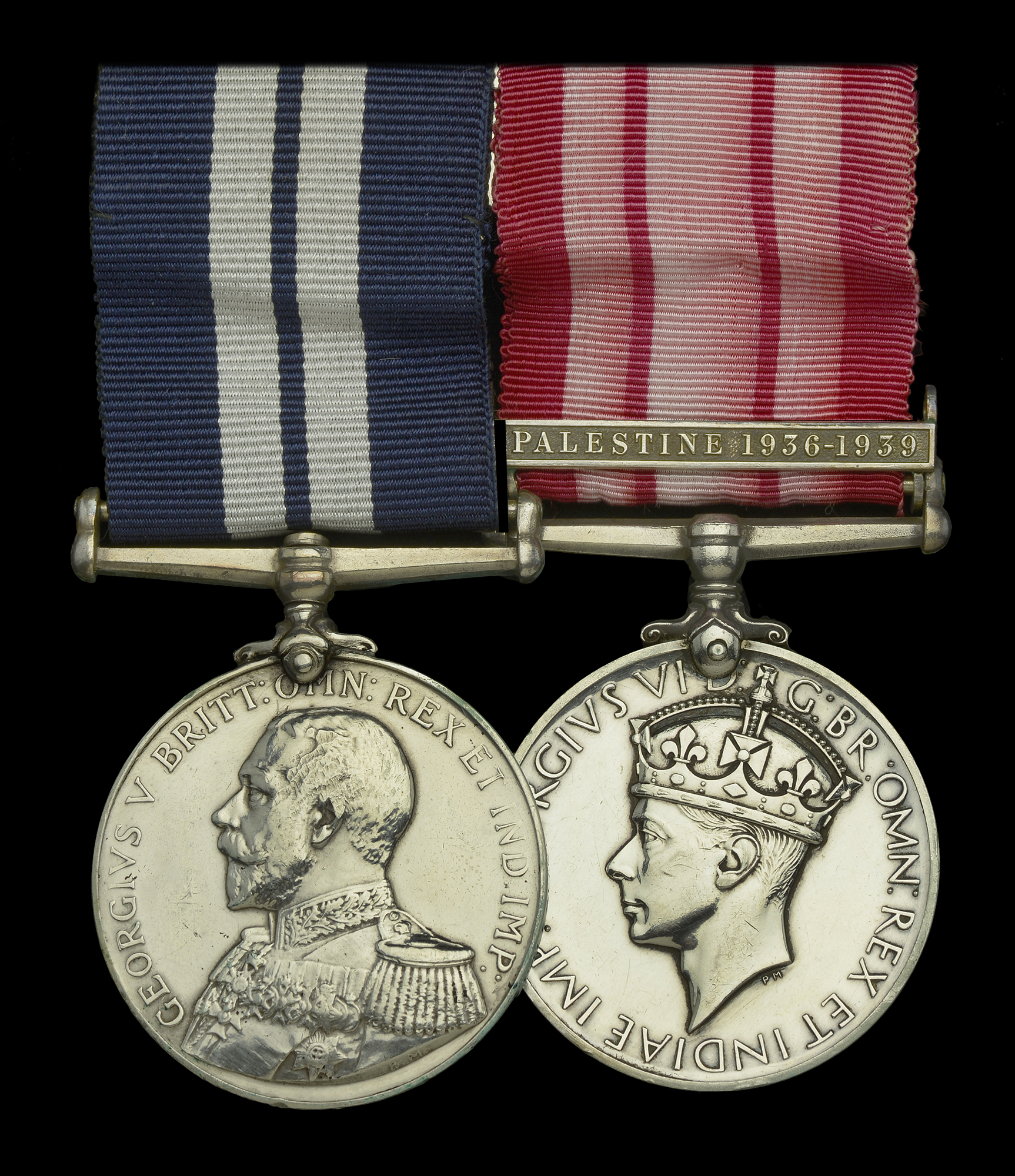The extremely rare inter-war Palestine D.S.M. pair awarded to Stoker Petty Officer H. J. Shorter, Royal Navy, a volunteer from H.M.S. Barham who was wounded whilst serving as a train guard during the volatile General Strike of 1936 Distinguished Service Medal, G.V.R. (K.28338 H. J. Shorter, S.P.O., R.N. Palestine 1936) impressed naming, official correction to first four letters of ‘Palestine’; Naval General Service 1915-62, 1 clasp, Palestine 1936-39 (K.28338 H. J. Shorter, S.P.O. R.N.) some edge bruising to the first, otherwise very fine and better (2) £3,000-£4,000 --- Importation Duty This lot is subject to importation duty of 5% on the hammer price unless exported outside the UK --- --- Provenance: Douglas-Morris Collection, Dix Noonan Webb, February 1997 - DSM only, since reunited with NGS. Just three D.S.M.s were awarded for the pre-war operations in Palestine, all in 1936, out of an equally rare total of 10 D.S.M.s for the entire inter-war period. D.S.M. London Gazette 6 November 1936: ‘For gallant and distinguished services rendered in connection with the emergency operations in Palestine during the period 15 April to 14 September 1936.’ Henry Jack Shorter was born in Shaftesbury, Dorset, on 21 April 1896, and joined the Royal Navy as a Stoker 2nd Class in October 1915. Having then served ashore in Victory II, he joined the cruiser H.M.S. Doris in the following year and remained similarly employed until the war’s end. Advanced to Stoker Petty Officer in October 1930, and awarded the L.S. & G.C. medal February 1931, he joined the battleship Barham on the Mediterranean station in August 1935. When a general strike was declared in Palestine on 20 April 1936, it was feared the country’s railway system would be crippled. High on the list of the local authorities’ concerns was the onward transportation of cargo landed at the ports of Jaffa and Haifa. In consequence, a call went out for volunteers from ships of the Fleet lying at Alexandria, including H.M.S. Barham, and 13 railway crews of an engine driver and fireman were formed, in addition to further ratings being trained in a variety of other related disciplines, including signalling. By the summer, extremists were responding with acts of sabotage and intimidation, and the volunteer train crews - who managed to maintain a sixty percent service - received a two-man armed guard. Nonetheless, the actions of the extremists were highly effective, incorporating as they did the removal of railway track, and the use of explosive devices on the rails. Another, and most unpleasant form of sabotage, because of the difficulty in seeing it, was the widening of the gauge so that trains came off the rails. On the afternoon of 4 September 1936, a heavy goods train pulled by two engines was derailed by sabotage on the Jaffa to Jerusalem line near Qalqiliya, just north of Lydda, causing the death of a British soldier, a native driver, and five other casualties. In the first engine the native driver was killed and the fireman scalded so badly that he later died. Of the two-man military guard, one was killed and the other injured. In the second engine, the driver and the two-man naval guard were also injured, including Shorter, who was scalded. Here, then, the origins of the award of his D.S.M. By September 1936, large troop reinforcements had arrived, and the military were able to take over all the tasks of the Royal Navy, apart from maintenance of the coastal patrol to guard against gun-running. Sir Samuel Hoare, First Lord of the Admiralty, paid tribute to the naval personnel serving ashore in a speech on 4 September 1936, after a visit to Haifa: “Once again, the Navy has readily met an unexpected emergency. If I wanted an example of its adaptability, what better could I have than an armoured train fitted out and manned by naval personnel?” Shorter was invested with his D.S.M. in June 1937, shortly before he was pensioned ashore. Recalled in the summer of 1939, he joined the destroyer Keppel and shared in her part in evacuating troops from France in May-June 1940, before to removing to the cruiser Penelope in June 1941. Towards the end of the year, Penelope joined Force K in the Mediterranean, and she went on to witness extensive action on the Malta run and elsewhere, so much so that she was nicknamed ‘H.M.S. Pepperot’ on account of damage sustained. Interestingly, Shorter’s service record states that he was surveyed at 64th General Hospital, M.E.F. in early November 1943. He was finally released ‘Class A’ in October 1945. Sold with copied research including contemporary newspaper and Illustraed London News reports with photographic illustrations.





